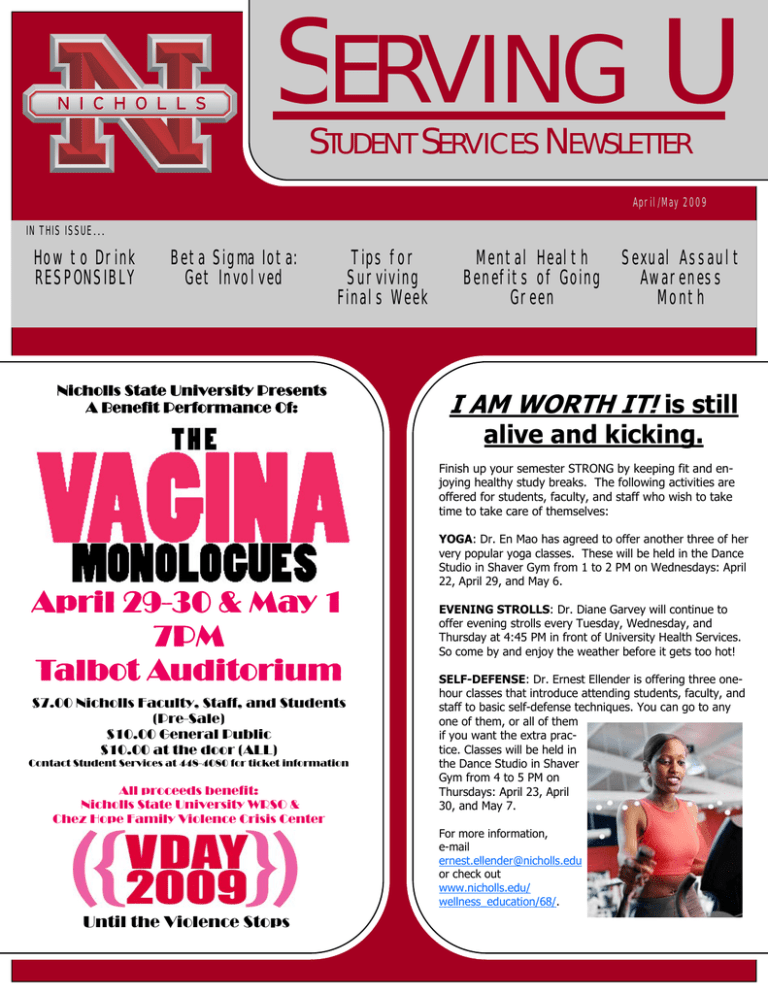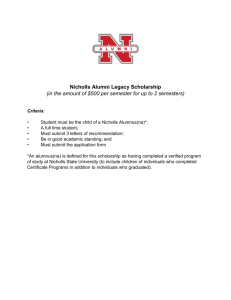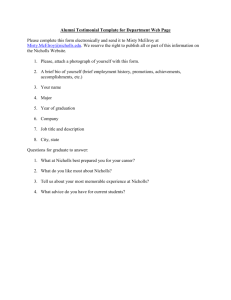
SERVING U
STUDENT SERVICES NEWSLETTER
April/May 2009
IN THIS ISSUE…
How to Drink
RESPONSIBLY
Beta Sigma Iota:
Get Involved
Tips for
Surviving
Finals Week
Nicholls State University Presents
A Benefit Performance Of:
Mental Health
Sexual Assault
Benefits of Going
Awareness
Green
Month
I AM WORTH IT! is still
alive and kicking.
Finish up your semester STRONG by keeping fit and enjoying healthy study breaks. The following activities are
offered for students, faculty, and staff who wish to take
time to take care of themselves:
April 29-30 & May 1
7PM
Talbot Auditorium
$7.00 Nicholls Faculty, Staff, and Students
(Pre-Sale)
$10.00 General Public
$10.00 at the door (ALL)
Contact Student Services at 448-4080 for ticket information
All proceeds benefit:
Nicholls State University WRSO &
Chez Hope Family Violence Crisis Center
YOGA: Dr. En Mao has agreed to offer another three of her
very popular yoga classes. These will be held in the Dance
Studio in Shaver Gym from 1 to 2 PM on Wednesdays: April
22, April 29, and May 6.
EVENING STROLLS: Dr. Diane Garvey will continue to
offer evening strolls every Tuesday, Wednesday, and
Thursday at 4:45 PM in front of University Health Services.
So come by and enjoy the weather before it gets too hot!
SELF-DEFENSE: Dr. Ernest Ellender is offering three onehour classes that introduce attending students, faculty, and
staff to basic self-defense techniques. You can go to any
one of them, or all of them
if you want the extra practice. Classes will be held in
the Dance Studio in Shaver
Gym from 4 to 5 PM on
Thursdays: April 23, April
30, and May 7.
For more information,
e-mail
ernest.ellender@nicholls.edu
or check out
www.nicholls.edu/
wellness_education/68/.
Until the Violence Stops
How to
Drink...
RESPONSIBLY
April is Alcohol Awareness Month, and the Counseling Center would like to
provide you with information on responsible alcohol consumption.
At the end of every Anheuser-Busch commercial there is an announcer stating “Please
drink responsibly.” But what exactly does that mean? Well, here are a few tips to help
you to get the most out of drinking:
First, so that we are all on the same page, “One drink” is defined as:
12 oz. of
beer
4 oz of
wine
1 ½ oz of
liquor
Generally, the rules that you want to follow are:
1.
Consuming 1-2 alcoholic drinks per hour will allow you to keep your “buzz.” Drinking at any
faster rate, your buzz decreases and depression increases (now that isn’t what you want!)
2.
Years of research prove that responsible alcohol consumption can be a part of a healthy lifestyle
(we have all heard the benefits of red wine on heart health). The thing is that those “health benefits”
start to disappear once consumption goes over about 2 drinks. So, the idea is to enjoy the beverage, and
enjoy the health benefits, and that means limiting the number of drinks per sitting to 1 or 2.
3.
Binge drinking is defined as 4 or more drinks in a single sitting for women, and 5 or more drinks
per sitting for men. (the number of drinks is different for men and women because metabolic factors
such as % body fat and estrogen levels). “Drinking Responsibly” means not binging, and not blackingout. Remember, if you want to keep your buzz, refer to rule #1.
4.
The black-out range usually occurs around 6 or more drinks—at that point your risk of accidents
and death start to rise dramatically. Additionally, part of having a good time and enjoying yourself includes being able to remember the good time; black-outs don’t allow that.
5.
As always, it is good practice to have a designated driver, which, ideally, is someone who is sober,
not just the person who is “least drunk.” Difficulties judging capabilities such as driving start to occur
at a BAL of .06 or about three alcoholic drinks, or sooner.
6.
Remember, “Drinking responsibly” means more than just having a designated driver bring you
home when you are passed-out drunk. There is a way to be “responsible” with alcohol and still
achieve that highly sought after warm buzz feeling (refer to rule 1) without sleeping on the bathroom
floor, hugging the toilet. The goal is to enjoy yourself without the unwanted negative side effects.
Beta Sigma Iota:
Helping to Give Students with Disabilities a Voice
In September 2007, Beta Sigma Iota–Order of Invictus, an advocacy group for Nicholls students with disabilities, was reactivated. The
mission of BSI is “to provide social, intellectual, and leadership assistance for the well-being of all students with disabilities on campus.”
BSI raises awareness about issues relating to those with disabilities so their peers can understand their daily challenges. We help others
to realize that what sometimes may seem like a small task to you is an obstacle for students with disabilities. We strive to educate our
Nicholls community so they understand that those with disabilities are not inadequate but are equals, and can accomplish the same
goals. However, they may have to use different approaches or methods on their journey.
BSI has joined forces with the Food and Allergy Committee, another Nicholls campus organization. Together we will increase awareness
for those who suffer from mild to severe allergies. Both organizations are few in number and would like others to help us give a voice to
those who are overshadowed in day-to-day life on campus.
We want our campus community to realize that allergies must be taken seriously because effects can range from a rash to anaphylactic
shock, which can be deadly without proper treatment. If you have allergies, or know someone with allergies, we desperately need your
help. Let’s join together and assist our fellow students so they, too, can enjoy our campus and their college experience.
We organize fundraisers such as bake sales where profits are generally assigned to one specific cause (e.g., the Myron Wright Foundation in Fall 2007). We also celebrate Disability Awareness Day in October in conjunction with the Office of Disability Services. Our focus
is not only to raise awareness by Nicholls students but also by faculty and staff.
If you have any questions, contact us at 985-448-4430, or contact us through Disability Services, located at 100-A Peltier Hall, next to the auditorium.
We welcome all students, faculty, staff, and alumni.
We look forward to welcoming you to the Beta Sigma Iota family!
Tips for Surviving Finals Week
Aaah! Finals are coming! With final exams, students have two goals. First, you want to ace the exams, or at least get decent grades and do
as well as possible. Second, there's your sanity; you want to get through exams with a minimum of stress and test anxiety. Fortunately, with
the right study skills techniques, you can both manage your stress and do well on the tests. Here are some study skills tips for final exams to
help you do well and stay sane.
1. Time management. Plan, plan, and plan. Before finals begin, get out your calendar and schedule as much of your finals week as possible. Then
stick with the schedule.
2. Schedule-in study breaks. Don't plan to study non-stop for the next five days. You'll go insane, and you'll be too fried to do well on the exams.
When you write your schedule, include short study breaks to help you recharge. You'll feel so much better and will be able to concentrate so much
more.
3. Schedule-in sleep. Some people can function well on three hours of sleep a night. Most cannot.
You'll do much better during exams if your mental state is good, and sleep is essential for this.
4. Exercise. There's no better source for stress relief. Just don't overdo it to the point that you're
procrastinating heavily. Go for short, stress-relieving activities, like racquetball or a treadmill run.
And don't underestimate the value of a brisk walk.
5. Prioritize. You have limited time to study and will have to choose what to spend the most time
with. You could spend hours and hours on that math exam because if you do really well, you might
be able to pull off a C. Or you can spend hours and hours on a history exam because if you do
well, you've got a good shot at an A. It's up to you.
6. Free your schedule. As much as possible, eliminate other responsibilities. Work fewer hours.
Put off social events. Definitely put off shopping.
7. Ask your professor for help. If you're confused about your notes or the readings, go to the resident expert. This works much better if you don't
put off studying until the last minute. It's a good idea to read through all of your notes before you start to study, so that you can inquire early about
things that confuse you.
8. Keep things in perspective. What's the worst thing that can happen if you don't do well on this test? Excessive stress will make you crazy and
hurt your performance on tests, so as much as you can, relax. And if you're having serious problems with anxiety during final exams, you can seek
help at the Counseling Center. This is a common problem that we are well equipped to help you with. Just give us a call at 985-448-4080 to schedule an appointment.
Mental Health Benefits of
Going Green
More and more people in our society are going green or are adopting practices that lead to more environmentally friendly and ecologically responsible decisions and lifestyles. “Going Green” has garnered
much attention and publicity over the years because of its healing powers and its benefits for the
earth. Not many people may know, but contact with nature can do more than just improve your
physical well being, but it can also improve your mental health well being as well. In a study done in
2005, researchers found that joggers who exercise in natural settings feel more restored, less anxious,
angry, and depressed than people who burn the same amount of calories in gyms or other built settings.
Natural settings help people to relax, rejuvenate, and renew their minds. Studies
have shown that people with access to natural settings have been found to be
healthier than individuals who don’t have access to natural settings. Adults who
participate in wilderness excursions describe “an increased sense of aliveness, wellbeing, and energy,” and note that the experience helps them make healthier lifestyle choices afterwards.
The greener a child’s play environment, the better the child functions. Going green has also been
shown to benefit children suffering with Attention-Deficit Hyperactivity Disorder (ADHD). A small
study conducted at the University of Illinois at Urbana-Champaign looked at how the environment
influenced a child’s concentration skills. During 20-minute walks in a park children who normally took
medications to control their ADHD symptoms stayed off the drugs completely on the days of the
walks. Based on the research “going green” works as well or better than medication on the child’s ability to concentrate.
Going green also has a connection with our in self esteem, interaction with others
and the well-being of our environment. In a noteworthy body of research in inner
-city housing projects in Chicago, investigators found that the presence of trees
outside apartment buildings predicted less procrastination, better coping skills,
less violence and better social relationships. The Kashi Web site includes an array
of social interactions for individuals such as “Challenge Yourself”. Here users can
suggest ways to help each other live better and decrease our harmful impact on
the planet. Some of the challenges include "Tour an organic farm," “Be needy,
not greedy,” and “Look for deals…naturally.”
Here are some ways you can inject more green into your schedule:
• Take a walk in local parklands and eat your lunch there
• Spend more time in your garden
• If you don't have a garden, grow vegetables or flowers on your porch
• Join a hiking club
• Put potted plants in your workspace
• Hang up pictures of nature scenes if you do not have any natural views
• Watch a nature show on television or listen to a nature sound CD
Information for this article has been adapted from: Environews, Ecos, Health Promotion International, Sara Snow’s “Fresh
Living,” and Richard Louv‘s “Last Child in the Woods: Saving Our Children from Nature-Deficit Disorder”
Student Services
on the web!
http://www.nicholls.edu/
services/
Ten Ways Nicholls Can Help Prevent Sexual Violence 1. Talk with one another about ways to show respect. 2. Challenge the social norms on campus by supporting a nonsexist, nonviolent environment. 3. Create a warm and nonjudgmental environment that encourages dialogue. 4. Infuse violence prevention into curriculum, assignments and research, emphasizing the idea that violence must be viewed as a campus and community issue. 5. Display campus and community resource information in places that all students have access. 6. Model healthy, safe and respectful behaviors, language and attitudes that do not contribute to a culture of violence. 7. Provide an environment that supports survivors who report being a victim of sexual violence. 8. Attend and participate in campus awareness events about violence and other prevention programs. 9. Enforce judicial processes in cases of sexual violence in a fair, sensitive manner. 10. Hold perpetrators accountable. Serving U
Nicholls Student Services
Newsletter
Office of Student Services
224 Elkins Hall
P.O. Box 2067
Thibodaux, LA 70310
Phone: (985)448-4080
Fax: (985) 448-4890
E-mail: Candace.Park@nicholls.edu
8 a.m. to 4:30 p.m. Mon - Fri
For more information regarding sexual assault prevention contact the Women’s Resource and Services Office at 448‐4470.


